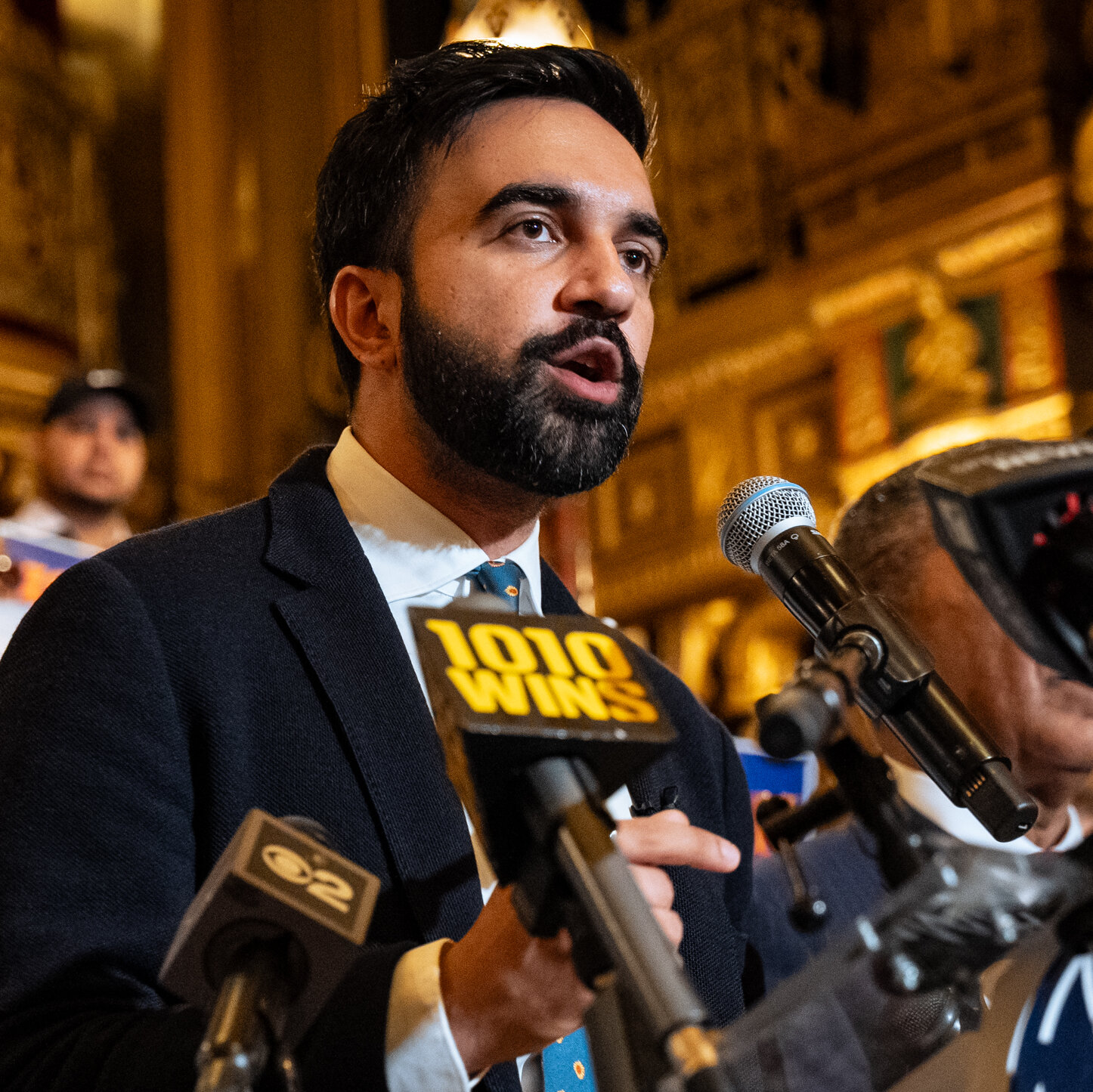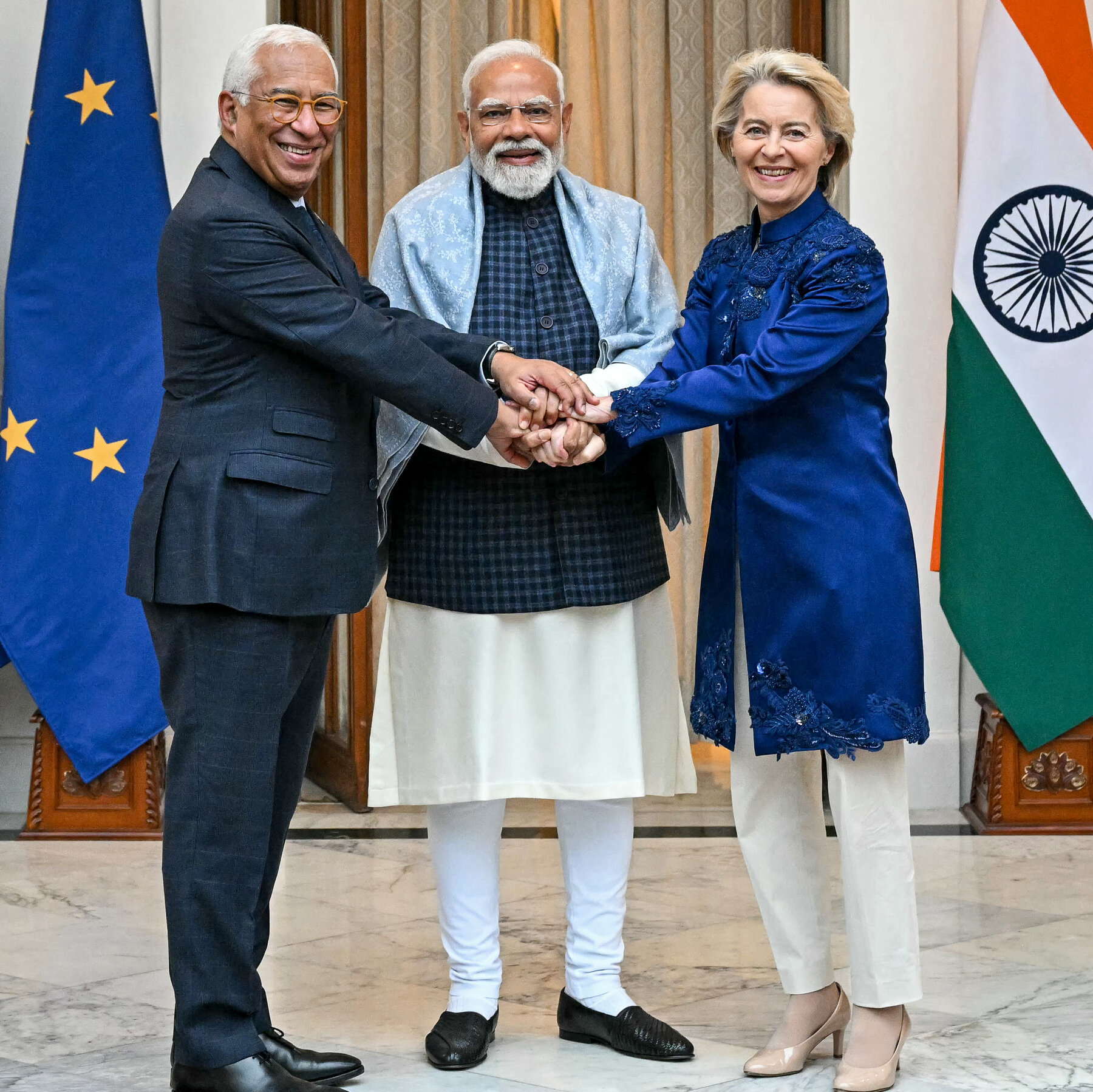
Zohran Mamdani, the Democratic nominee for New York City mayor, told an influential group of business leaders on Tuesday that he would not use the phrase “globalize the intifada,” which has been seen as a call to violence against Jews, and would “discourage” others from doing so, according to three people familiar with his comments.
The phrase has been a rallying cry among opponents of the war in Gaza, and Mr. Mamdani, an ardent critic of Israel’s military operations, had refused to condemn its use during the Democratic primary race that he won in June.
His comments came in a closed-door meeting with roughly 150 business executives at the offices of Tishman Speyer in Rockefeller Center. It was hosted by the Partnership for New York City, a consortium of members representing banks, law firms and corporations.
Mr. Mamdani told the group that while many people used the term to express solidarity with Palestinians, some New Yorkers viewed it as a reference to violence against Israel, according to one of the people who were familiar with his comments.
Just two weeks ago, shortly after his primary victory, Mr. Mamdani said in an interview on “Meet the Press” that the term was “not language that I use” but that “I don’t believe that the role of the mayor is to police speech.”
Mr. Mamdani’s shifting language comes as his campaign moves from his stunning victory in the June primary to the general election in November, when he faces a fractured field of competitors including Mayor Eric Adams and former Gov. Andrew M. Cuomo, who are running as independents, and the Republican nominee, Curtis Sliwa.
Some business leaders have been skeptical or outright hostile toward Mr. Mamdani, a democratic socialist assemblyman from Queens who has called for raising both income and corporate taxes.

The meeting, which lasted nearly 90 minutes, involved mostly polite, but some pointed, questioning from business leaders.
Jeff Blau, the chief executive of Related, the real estate giant, asked Mr. Mamdani whether his policies would drive the private sector out of New York, according to three people who attended the meeting.
Mr. Mamdani stressed to Mr. Blau that he would continue to learn from business leaders and emphasized that his goal was not to drive business out of New York.
Rob Speyer, the chief executive of Tishman Speyer, a real estate company, asked Mr. Mamdani whether he was concerned that raising taxes would create an exodus from New York, according to a person who attended the meeting.
Mr. Mamdani, 33, seemed largely at ease during the meeting, joking about his youth at one point, and avoided getting defensive. Several participants said that they found him a personable speaker, but that his responses to questions lacked specifics.
Kathy Wylde, the Partnership’s chief executive, described the attitude of her membership after the meeting as “guarded.”
“But most recognized that he’s a smart young man and a good communicator and the proof will be in the pudding,” she said.
Some attendees said the meeting amplified their concerns.
“Today’s meeting made it clear to me that I need to do everything in my power to make sure Zohran Mamdani does not become mayor of New York City,” said Jon Henes, the founder of C Street Advisory Group, a communications consulting firm. “His complete lack of executive experience, his naïve understanding of how the world works and his rigidly ideological views, including socialism, would be dangerous for the city’s future.”
At one point during the meeting, Mr. Mamdani was asked about the progressive mayors of Boston and Chicago, Michelle Wu and Brandon Johnson, and whom he was more aligned with, according to a person who attended. Mr. Mamdani leaned into his admiration for Ms. Wu, whom he has praised in the past and who appears to have a higher approval rating than Mr. Johnson.
Mr. Mamdani is expected to meet again with Partnership members on Wednesday to discuss the city’s tech sector.
“Zohran appreciated the meeting today and felt it was a constructive, honest discussion,” said Jeffrey Lerner, a spokesman for Mr. Mamdani. “We look forward to the opportunity to build on this conversation, even in navigating disagreement on fiscal policy.”
The topic of Israel was a focal point for several of the business leaders at Tuesday’s meeting. Albert Bourla, the chief executive of Pfizer, pushed Mr. Mamdani about the meaning of genocide and defended Israel’s war in Gaza, according to two people who attended the meeting.
Mr. Mamdani, who would be the city’s first Muslim mayor, has repeatedly expressed sadness over the plight of the Palestinian people. He also teared up on the campaign trail as he recalled the “dehumanizing language” he had faced, including a message he received that said, “The only good Muslim is a dead Muslim.”
After his comments about the term “globalize the intifada” received scrutiny, Mr. Mamdani said he understood the concerns among Jewish New Yorkers over antisemitism and highlighted his plan to increase funding for anti-hate-crime programs.
Two prominent Democrats from New York — Representative Hakeem Jeffries, the party’s leader in the House, and Senator Chuck Schumer, the Senate minority leader, have expressed concern about Mr. Mamdani’s refusal to condemn the term “globalize the intifada.” Mr. Jeffries and Mr. Schumer have not yet endorsed Mr. Mamdani, diverging from some other Democrats in Congress
Mr. Schumer said on Tuesday that he had spoken to Mr. Mamdani on Monday night and would meet with him in New York.
“What ‘globalize the intifada’ means is really wrong and should be condemned, and I look forward to my discussions with Mr. Mamdani,” Mr. Schumer told reporters.








-3.png)



